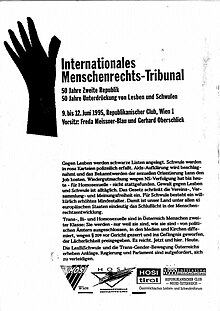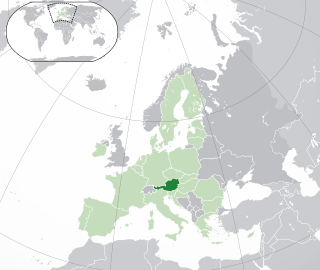
Lesbian, gay, bisexual, and transgender (LGBT) rights in Austria have advanced significantly in the 21st century. Both male and female same-sex sexual activity are legal in Austria. Registered partnerships were introduced in 2010, giving same-sex couples some of the rights of marriage. Stepchild adoption was legalised in 2013, while full joint adoption was legalised by the Constitutional Court of Austria in January 2015. On 5 December 2017, the Austrian Constitutional Court decided to legalise same-sex marriage, and the ruling went into effect on 1 January 2019.

Lesbian, gay, bisexual, and transgender (LGBT) people in Afghanistan face severe legal challenges and discriminations not experienced by non-LGBT residents. Afghan members of the LGBT community are forced to keep their gender identity and sexual orientation secret, in fear of harassment, intimidation, persecution, violence, and the death penalty. The religious nature of the country has limited any opportunity for public discussion, with any mention of homosexuality and related terms deemed taboo.
Same-sex marriage has been legal in Austria since 1 January 2019. On 4 December 2017, the Constitutional Court ruled that the non-discrimination and equality provisions of the Constitution of Austria guarantee same-sex couples the right to marry. The decision took effect on 1 January 2019, making Austria the second country in Central Europe to legalise same-sex marriage after Germany, the 16th in Europe, and the 25th worldwide. Austria has also recognised same-sex registered partnerships since 1 January 2010, providing several, but not all, of the rights, benefits, obligations and responsibilities of marriage.

Lesbian, gay, bisexual, and transgender (LGBT) persons in Cape Verde are afforded greater protections than those in many other African countries. Both male and female same-sex sexual activities are legal in Cape Verde. Additionally, since 2008, employment discrimination on the basis of sexual orientation has been banned, making Cape Verde one of the few African countries to have such protections for LGBT people. Nevertheless, Cape Verde does not recognize same-sex unions or marriages, meaning that same-sex couples may still face legal challenges not experienced by non-LGBT residents. Households headed by same-sex couples are still not eligible for the same legal protections available to opposite-sex couples.

Lesbian, gay, bisexual, and transgender (LGBT) persons in Honduras face legal challenges not experienced by non-LGBT residents. Both male and female same-sex sexual activity are legal in Honduras.

Lesbian, gay, bisexual, and transgender (LGBT) people in Somalia face severe challenges not experienced by non-LGBT residents. Consensual same-sex sexual activity is illegal. In areas controlled by Al-Shabab, and in Jubaland, capital punishment is imposed for such sexual activity. In other areas, where Sharia does not apply, the civil law code specifies prison sentences of up to three years as penalty. LGBT persons are regularly prosecuted by the government and additionally face stigmatization among the broader population. Stigmatization and criminalisation of homosexuality in Somalia occur in a legal and cultural context where 99 percent of the population follow Islam as their religion, while the country has had an unstable government and has been subjected to a civil war for decades.

Freda Meissner-Blau was an Austrian politician, activist, and prominent figurehead in the Austrian environmental movement. She was a founder and the federal spokesperson of the Austrian Green Party.

Lesbian, gay, bisexual, and transgender (LGBT) persons in the Dominican Republic do not enjoy the same rights as non-LGBT residents, and face legal and social challenges that are not experienced by other people. While the Dominican Criminal Code does not expressly prohibit same-sex sexual relations or cross-dressing, it also does not address discrimination or harassment on the account of sexual orientation or gender identity, nor does it recognize same-sex unions in any form, whether it be marriage or partnerships. Households headed by same-sex couples are also not eligible for any of the same rights given to opposite-sex married couples, as same-sex marriage is constitutionally banned in the country.
Frederick Douglas Stephan "Fred" Baker was an Austrian-British filmmaker, media scholar, and archaeologist.
The Austrian Association of Women Artists was founded in 1910. The VBKÖ is located at Maysedergasse 2/4, Vienna 1010, its founding headquarters. The association supports improvements to the economic and educational conditions of female artists, as well as promoting the artists themselves.
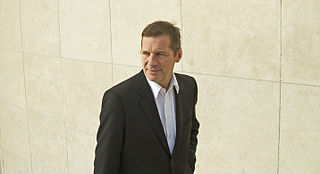
Christian Michelides is an Austrian psychotherapist. He is the director of Lighthouse Wien.
Gerhard Fritz Oberschlick is an Austrian essayist. From 1985 to 1995 he was the editor of the political and cultural magazine FORVM. Today he serves as the literary executor of Günther Anders.
The Austrian Lesbian and Gay Forum (ALGF), in German: Österreichisches Lesben- und Schwulenforum (ÖLSF), was the driving force in Austria's LGBT movement in the 1990s and has founded Austria's only Christopher Street Day (CSD) parade, called Regenbogenparade, on Vienna's Ringstrasse in 1996.
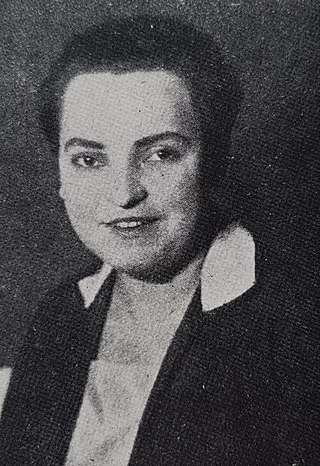
Selma "Selli" Engler was a leading activist of the lesbian movement in Berlin from about 1924 to 1931.

Gerhart Holzinger is an Austrian jurist, educator, and career civil servant. He was appointed to the Austrian Constitutional Court in 1995, serving as its president from 2008 until his retirement in 2017.
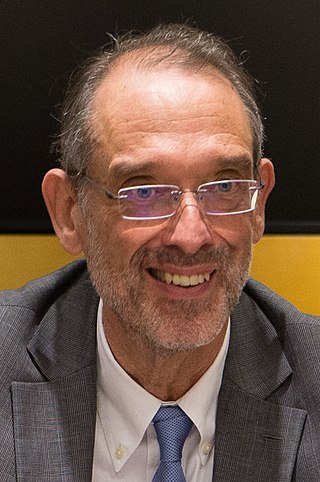
Heinz Faßmann is an Austrian politician and professor of human geography and land-use planning at the University of Vienna. He served as the Minister of Education in the Second Kurz cabinet in the government of Chancellor Sebastian Kurz and the Schallenberg government of Chancellor Alexander Schallenberg. He previously served in the same capacity from December 2017 to June 2019: he was succeeded in the post by Martin Polaschek in December 2021. Faßmann is considered to be aligned with the Austrian People's Party (ÖVP) but holds no formal party membership or affiliation.

Karl Korinek was an Austrian constitutional scholar and educator. Korinek taught law at the University of Graz, the Vienna University of Economics and Business, the University of Vienna, and the University for Continuing Education Krems. In 1978, Korinek was appointed to the Austrian Constitutional Court; he served as the president of the court from 2003 until his retirement in 2008.

Irina Fedotova is a Russian LGBT and human rights activist. She filed the case Fedotova v. Russia (1932/2010) with the United Nations Human Rights Committee to challenge the gay propaganda law in Ryazan and also the case Fedotova and Others v. Russia with the European Court of Human Rights, which ruled in 2021 that Russia had violated her rights by failing to provide any recognition to her same-sex relationship.
Ursula Sillge is a German sociologist and LGBT activist. She organized the first national lesbian gathering in East Germany, and between 1970 and 1990 was one of the main lesbian activists in the country, pressing authorities to recognize the rights and allow visibility of the LGBT community. In 1986, she founded the Sunday Club in Berlin. It was the only secular association representing homosexuals in the 1980s, though it was not officially recognized. The organization became the first legal association to represent the LGBT community in East Germany when it was allowed to register in 1990. Sillge resigned as director of the Sunday Club in 1991 to found the LGBT archive known as the Lila Women's Archives. After the fall of the Berlin Wall, she was able to earn her doctorate. In addition to running the archives, she has published several works about homosexuality and women behind the Iron Curtain.
Vienna, the capital of Austria, has an active LGBTQIA+ community. Vienna is considered Austria's queer capital, with several LGBTQIA+ spaces, organisations and a history of LGBTQIA+ activism going back to the late 19th century.
